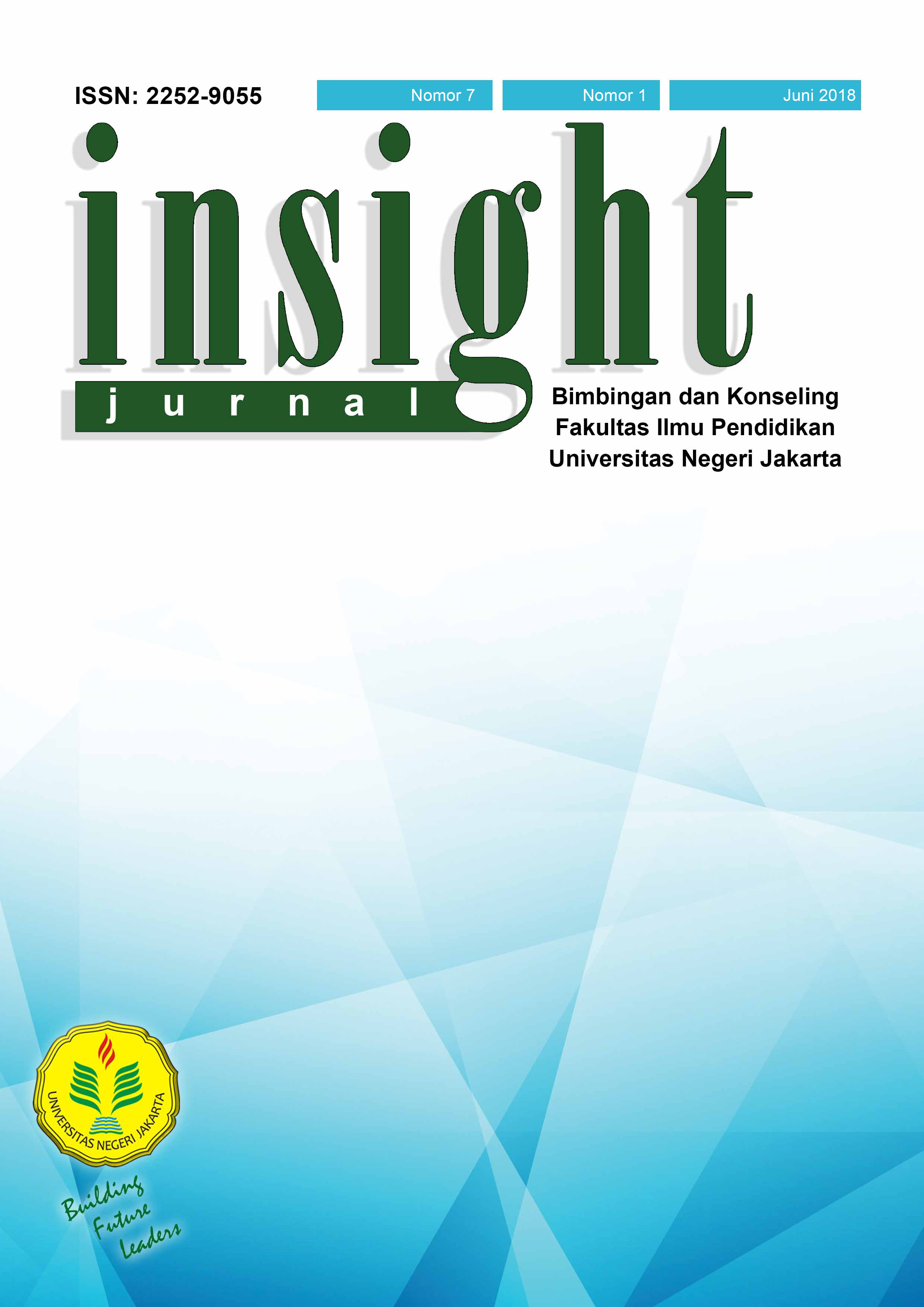Latihan Asertif: Sebuah Intervensi yang Efektif
DOI:
https://doi.org/10.21009/insight.071.10Keywords:
Konseling Behavioral, Asertif, Latihan AsertifAbstract
Latihan asertif dalam pendekatan konseling behavioral adalah sebuah cara yang digunakan untuk mengajarkan individu mengenai cara mengekspresikan perasaan positif dan negatif secara terbuka dan langsung. Hal ini menjadi penting karena seorang individu memiliki hak untuk mengekspresikan perasaannya secara terbuka. Berdasarkan penelitian yang telah dilakukan diberbagai tempat didunia, latihan asertif merupakan teknik yang efektif untuk meningkatkan keterampilan sosial seperti prilaku asertifitas, kemampuan individu dalam mengekspresikan perasaan, dan keterampilan berkomunikasi secara terbuka kepada orang lain. Tulisan ini akan membahas efektifitas latihan asertif dalam meningkatkan keterampilan sosial individu.
References
Alberti, R., and Emmons, M. (2001). Your perfect right: Assertiveness and equality in your life and relationship. New York: Impact.
Bornstein, M.l R., Et.Al. (1977). Social-Skills Training For Unassertive Children: A Multiple-Baseline Analysis. Journal Of Applied Behavior Analysis, 10, 183-195.
Çeçen-Erogul, Rezan. A, & Zengel, Mustafa. (2009). The Effectiveness of an Assertiveness Training Programme on Adolescents’ Assertiveness Level. Elementary Education Online, 8, 485-492.
Corey, Gerald. (2013). Case Approach to Counseling & Psychotherapy (8th Ed.). Belmont: Brooks/Cole.
Corey, Gerald. (2012). Student Manual for Theory & Practice of Counseling & Psychotherapy. Belmont: Brooks/Cole.
Corey, Gerald. (2013). Theory & Practice of Counseling & Psychotherapy (9th Ed.). Belmont: Brooks/Cole.
Hammed, T.A. (1999). Fostering Interpersonal Skills among Selected Bank Workers through Assertiveness Training and Transational Analysis. Unpublished PhD Thesis, University of Ibadan, Ibadan.
Kling, W. (1990). A preliminary investigation of Toughlore. Assertiveness and support is a parent; self help group. Paper presented at the annual convention of the American psychological association Boston. August 10 -14.
Kirst, Laura K. (2011). Investigating The Relationship Between Assertiveness And Personality Characteristics. (Thesis, Psikologi, University of Central Florida, 2011). University of Central Florida. Florida
Lazarus, A.A. (1971). Behaviour therapy and beyond. New York: McGraw-Hill Book Coy
Lin, Yen-Ru, et.al. (2004). Evaluation of an assertiveness training program on nursing and medical students’ assertiveness, self-esteem, and interpersonal communication satisfaction. Nurse Education Today, 24, 656-665.
Linehan, Marsha. M. et.al. (1979). Assertion therapy: Skill training or cognitive restructuring. Behavior Therapy, 10, 372-388.
Manungingsih, I.Y. (2014). Keefektifan latihan asertif untuk meningkatkan kemampuan berkata tidak bagi siswa SMP. (Skripsi, Ilmu Pendidikan, Universitas Negeri Malang, 2014). Universitas Negeri Malang. Malang
M. Mcfall, R. & Muehlenhard, C.L. (1983). Automated Assertion Training: A Feasibility Study. Journal Of Social And Clinical Psychology, 1, 246-258.
Retnomanisya, T.Y & Suharso, Sugiharto. (2013). Mengatasi Perilaku Terisolir Siswa Menggunakan Teknik Asertif Training Pada Siswa Kela VI. Indonesian Journal of Guidance and Counseling: Theory & Application, 2, 1-7.
Sanyata, S. (2012). Teori dan Aplikasi Pendekatan Behavioristik dalam Konseling. Jurnal Paradigma, 14, 1-11.
Shimizu, Takashi. Et.al. (2004). Relationship Between Self-Esteem and Assertiveness Training Among Japanese Nurses. J Occup Health, 46, 296-298.
Trisnaningtyas, Esti & Nursalim, Mochamad. (2009). Penerapan Latihan Asertif Untuk Meningkatkan Keterampilan Komunikasi Interpersonal Siswa. Unpublished Journal Unesa University.
Wise, K.L. (1991). A social skills training for young adolescents. Adolescence, 26, 233 – 235.
Downloads
Published
Issue
Section
License
Authors who publish with this Journal agree to the following terms:
- Author retain copyright and grant the journal right of first publication with the work simultaneously licensed under a creative commons attribution licensethat allow others to share the work within an acknowledgement of the work’s authorship and initial publication of this journal.
- Authors are able to enter into separate, additional contractual arrangementfor the non-exclusive distribution of the journal’s published version of the work (e.g. acknowledgement of its initial publication in this journal).
- Authors are permitted and encouraged to post their work online(e.g. in institutional repositories or on their websites) prior to and during the submission process, as it can lead to productive exchanges, as well as earlier and greater citation of published works.
Users/public use of this website will be licensed to CC BY







